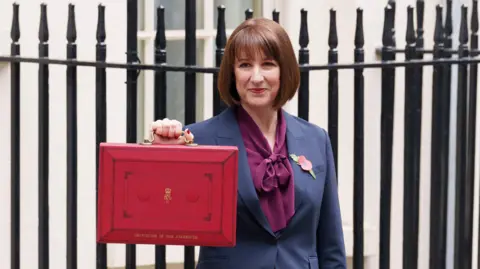
 Getty Images
Getty Images
Chancellor Rachel Reeves always knew she was going to spend many days explaining her Budget.
The reaction of those paying the bills for this near-record increase in taxes was always going to be harsh. For the chancellor, her political pain for now is a price worth paying.
The Budget is about the long game on the economy. This is not speed chess, to reference Reeves’s favourite pastime.
And in looking to reboot Britain’s economic model, the chancellor’s most helpful asset is the fact she has a landslide majority to credibly pass all of these policies in to law.
This is one of the many differences from Liz Truss’ mini budget and is sometimes underrated. During that budget in 2022, the markets were not just testing the economic credibility of a PM and chancellor, but their political credibility too, to get a rather different set of economic policies through the Commons.
Look at France right now, which is trying to rein in its levels of government borrowing, but has a minority government made up of the third biggest party, trying to pass tough measures.
The markets don’t have as much confidence in a minority government as they would in a government like the UK, which has a big majority.
Credibility
Two critical assets for a new chancellor (that eluded Kwasi Kwarteng) are political credibility to pass Budgets, and financial credibility with markets.
On the crucial government bond markets, which are a verdict on budgets, but also impact the rate of mortgage and business loans, it is fair to say there is more that an arched eyebrow now.
While at the time of the Budget speech there was no response, the publication of the plans for the increase in the sale of government bonds has set off a marked rise in interest rates. This is because the government is borrowing more than the markets expected. The reaction now is notable, but remains orderly.
This is partly a market repricing of the increased need for loans to the UK government, and the expectation that the Bank of England, facing more post-Budget inflationary pressures, will no longer cut interest rates quite as quickly.
Rates might not fall below 4% next year, as previously expected. The next words from the Bank of England, when it releases its new inflation forecast next week, will be closely watched.
Mammoth changes
The response has been modest given the mammoth changes seen in Wednesday's Budget, with £76bn a year in new spending, half funded by tax and half by borrowing.
The chancellor’s aides say the critical fact is that the borrowing is mostly for big long term UK investment in major capital projects.
The plans increase investment by £105bn versus previous Conservative plans for significant cuts, leaving borrowing at the highest sustained level in half a century.
This could be much better for long term economic growth, and not as inflationary. Clearly, it depends on what the money is spent on.
The sums are significant and suggestive of Joe Biden’s plans in the US which saw billions of government dollars invested into the economy.
The Energy Secretary Ed Miliband was in the US last week visiting the key officials in charge of disbursing the record subsidies and loans made available in the $400bn Inflation Reduction Act. One lesson from the US is that it takes time to build up the pipeline of good government investments.
While the US's private sector took an immediate cue from the massive government announcements, it took one to two years to get the state machine ramped up.
The whole mammoth offer of Wednesday's UK Budget could be seen as a bet on the new government having the skills and the judgement to kick start high productivity investment and so get the growth that was lacking in the forecasts.
Of course it is plausible that the Biden US strategy might not last the week, should Donald Trump return to the White House.
But unlike Joe Biden, the PM, his chancellor and energy secretary have at least four years to try to deliver.
Long term economics is why they will be taking the political punches right now.

 Movie
Movie 2 months ago
30
2 months ago
30 





![Presidents Day Weekend Car Sales [2021 Edition] Presidents Day Weekend Car Sales [2021 Edition]](https://www.findthebestcarprice.com/wp-content/uploads/Presidents-Day-Weekend-car-sales.jpg)



 English (United States)
English (United States)